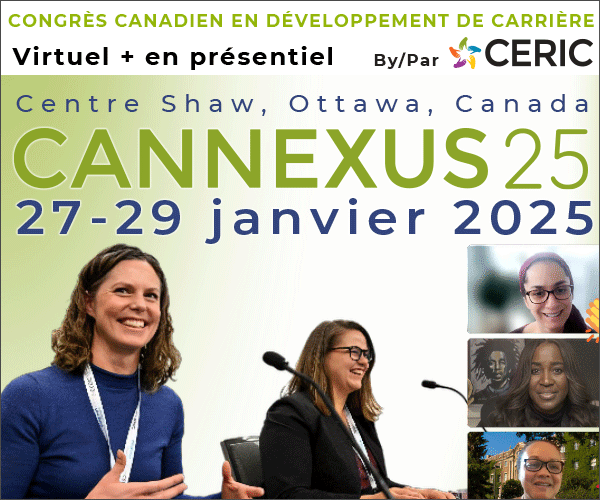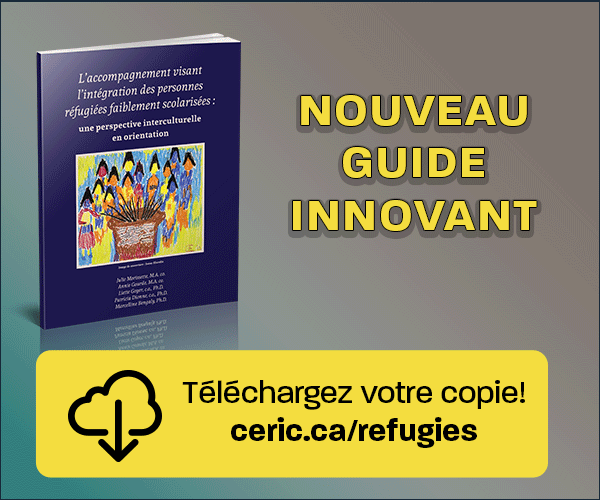La relation entre les attitudes à l'égard des nouvelles approches de carrière et les perceptions subjectives de réussite professionnelle des employés typiques et flexibles
DOI :
https://doi.org/10.53379/cjcd.2024.392Mots-clés :
Développement de carrière, Une carrière sans frontières, Carrière protéiforme, Réussite professionnelle subjective, le travail flexibleRésumé
Cette étude est centrée sur l'examen de trois concepts distincts, qui ont subi une adaptation des paradigmes conventionnels aux perspectives contemporaines. Ces transformations concernent le passage d'un régime d'emploi typique à des modèles d'emploi flexibles, l'évolution d'une conception traditionnelle de la carrière à de nouvelles approches de la carrière, et la transition de l'accent mis sur la réussite objective de la carrière à l'adoption de mesures subjectives de la réussite de la carrière. L'objectif principal de cette recherche réside dans l'analyse comparative des employés à temps plein et à temps partiel en ce qui concerne leur assimilation de ces nouveaux cadres conceptuels. Cette étude vise à comparer et à révéler l'attitude de carrière sans limites, l'attitude de carrière protéiforme et les perceptions subjectives de réussite professionnelle, ainsi que leurs sous-dimensions, entre les employés typiques et les travailleurs flexibles, ainsi qu'à examiner leurs relations. La recherche a été menée à l'aide de 895 questionnaires (412 employés à temps flexible, 483 employés à temps plein) administrés à des personnes travaillant dans des agences d'emploi privées. L'analyse T-test a été utilisée pour tester les hypothèses de recherche et identifier les différences. Selon les résultats de l'analyse de l'étude, les travailleurs flexibles ont des attitudes de carrière sans limites, une mobilité psychologique, une mobilité physique et des attitudes de carrière axées sur les valeurs plus élevées que les travailleurs typiques. En ce qui concerne la réussite professionnelle subjective, les travailleurs typiques sont plus nombreux que les travailleurs à horaires flexibles.
Références
Akkermans, J. & Kubasch, S. (2017). Trending topics in careers: a review and future research agenda. Career Development International, 22(6), https://doi.org/10.1108/CDI-08-2017-0143
Amuedo-Dorantes, C. & Serrano-Padial, R. (2007). Wage growth implications of fixed-term employment: An analysis by contract duration and job mobility. Labour Economics, 14(5), 829-847, https://doi.org/10.1016/j.labeco.2006.09.001
Arthur, M. (1994). The boundaryless career: a new perspective for organizational inquiry. Journal of Organizational Behavior, 15(4), 295–306. https://doi.org/10.1002/job.4030150402
Arthur, M. B., Inkson, K. & Pringle, J. K. (1999). The New Careers: Individual Action and Economic Change. Sage Publications.
Arthur, Khapova, S. N. & Wilderom, C. P. (2005). Career success in a boundaryless career world. Journal of Organizational Behavior, 26(2), 177-202. https://doi.org/10.1002/job.290
Arthur, M. B. & Rousseau, D. M. (1996). A career lexicon for the 21st century. Academy of Management Perspectives, 10(4), 28-39. https://doi.org/10.5465/ame.1996.3145317
Ashford, S. J., Caza, B. B., & Reid, E. M. (2018). From surviving to thriving in the gig economy: A research agenda for individuals in the new world of work. Research in Organizational Behavior, 38, 23–41.
Aydın Göktepe, E. (2016). Yeni kariyer tutumları, algılanan yönetici desteği ve işe tutkunluk arasındaki ilişki: bir araştırma. [Doctoral Dissertation. Istanbul University, Management Department, Istanbul].
Aytemiz Seymen, O. (2004). Geleneksel kariyerden, sınırsız ve dinamik / değişken kariyere geçiş: nedenleri ve sonuçları üzerine yazınsal bir inceleme, Uludağ Üniversitesi. İktisadi ve İdari Bilimler Fakültesi Dergisi, Vol. 23(1), 79-114.
Banai, M. & Harry, W. (2004). Boundaryless global careers: The international itinerants”. International Studies of Management & Organization, 34(3), 120. https://doi.org/10.1080/00208825.2004.11043705
Berkmen, M. B. (2018). “Kısmi ve tam zamanlı çalışanların mesleki doyum, iş doyumu ve iş-yaşam dengesi ilişkileri üzerine bir araştırma”. [Master’s thesis, Kırklareli Üniversitesi Social Science Institute, Kırklareli]
Biemann, T., Zacher, H. & Feldman, D. C. (2012). Career patterns: A twenty-year panel study. Journal of Vocational Behavior, 81(2), 159-170. https://doi.org/10.1016/J.JVB.2012.06.003
Briscoe, J. P. & Finkelstein, L. M. (2009). The “new career” and organizational commitment: Do boundaryless and protean attitudes make a difference? Career Development International, 14(3), 242-260. https://doi.org/10.1108/13620430910966424
Briscoe, J. P. & Hall, D. T. (2006). The interplay of boundaryless and protean careers: Combinations and implications. Journal of Vocational Behavior, 69(1), 4–18. https://doi.org/10.1016/j.jvb.2006.02.001
Briscoe, J. P., Hall, D. T. & DeMuth, R. L. F. (2006). Protean and boundaryless careers: An empirical exploration. Journal of Vocational Behavior, 69(1), 30–47. https://doi.org/10.1016/j.jvb.2005.09.003
Briscoe, J. P., Henagan, S. C., Burton, J. P. & Murphy, W. M. (2012). Coping with an insecure employment environment: The differing roles of protean and boundaryless career orientations. Journal of Vocational Behavior, 80(2), 308–316. https://doi.org/10.1016/j.jvb.2011.12.008
Briscoe, J. P., Kaše, R., Dries, N., Dysvik, A., Unite, J. A., Adeleye, I., ... & Zikic, J. (2021).Here, there, & everywhere: Development and validation of a cross-culturally representative measure of subjective career success. Journal of Vocational Behavior, 130. 103-612. https://doi.org/10.1016/j.jvb.2021.103612
Budak, G. & Gürbüz, S. (2017). Öznel kariyer başarısı: Bir ölçek uyarlama çalışması. İş ve İnsan Dergisi, 4(2), 87-99. https://doi.org/10.18394/iid.280529
Cappelli, P. (1999). Career jobs are dead. California Management Review, 42(1), 146–167. https://doi.org/10.2307/41166023
Conway, N. & Briner, R. B. (2002). Full-time versus part-time employees: Understanding the links between work status, the psychological contract, and attitudes. Journal of Vocational Behavior, 61(2), 279–301. https://doi.org/10.1006/jvbe.2001.1857
Çakmak, K. Ö. (2011). Çalışma yaşamındaki güncel gelişmeler doğrultusunda değişen kariyer yaklaşımları ve örgüte bağlılığa etkisine ilişkin bir araştırma. [Doctoral Dissertation, İstanbul University, Social Science Institute, Istanbul]
Çakmak-Otluoğlu, K. Ö. (2012). Protean and boundaryless career attitudes and organizational commitment: The effects of perceived supervisor support. Journal of Vocational Behavior, 80(3), 638-646. https://doi.org/10.1016/j.jvb.2012.03.001
Çakmak-Otluoğlu, K. Ö. & Bulut, Ö. (2020). Sınırsız ve bağımsız kariyer yönelimlerinin kariyer bağlılığına etkisi üzerine bir araştırma. Adıyaman Üniversitesi Sosyal Bilimler Enstitüsü Dergisi, 34, 299-327. https://doi.org/10.14520/adyusbd.587260
Dai, L. & Song, F. (2016). Subjective career success: a literature review and prospect. Journal of Human Resource Sustainability Studies, 4(3), 238-242. https://doi.org/10.4236/jhrss.2016.43026
De Feyter, M., Smulders, P. & Vroome, E. D. (2001). De inzetbaarheid van mannelijke en vrouwelijke werknemers. Kenmerken van invloed. Tijdschrift voor Arbeidsvraagstukken, 17(1), 47-59. https://doi.org/10.1007/BF01810956
Denton, M. A., Davis, C. K., Hayward, L. & Hunter, A. A. (1987). Employment survey of 1985 graduates of Ontario universities: Report of majorfindings. Toronto: Queen’s Printer for Ontario.
Direnzo, M. S. & Greenhaus, J. H. (2011). Job search and voluntary turnover in a boundaryless world: A control theory perspective. Academy of Management Review, 36(3), 567-589. https://doi.org/10.5465/amr.2009.0333
Dubinsky, A. J., & Skinner, S. J. (1984). Job status and employees’ responses: Effects of demographic characteristics. Psychological Reports, 55(1) 323–328.
Duggan, J., Sherman, U., Carbery, R., & McDonnell, A. (2022). Boundaryless careers and algorithmic constraints in the gig economy. The International Journal of Human Resource Management, 33(22). 4468–4498.
Eberhardt, B. J. & Shani, A. B. (1984). The effects of full-time versus part-time employment status on attitudes toward specific organizational characteristics and overall job satisfaction. Academy of Management Journal, 27(4), 893-900.
Eby, L. T., Butts, M. & Lockwood, A. (2003). Predictors of success in the era of the boundaryless career. Journal of Organizational Behavior, 24(6), 689–708. https://doi.org/10.1002/job.214
Enache, M., Sallan, J. M., Simo, P. & Fernandez, V. (2011). Career attitudes and subjective career success: Tackling gender differences. Gender in Management: an International Journal, 26(3), 234-250. https://doi.org/10.1108/17542411111130990
Feldman, D. C. (1990). “Reconceptualizing the nature and consequences of part-time work”. Academy of Management Review, 15(1), 103-112.
Feldman, D. C. (1995). Managing part-time and temporary employment relationships: Individual needs and organizational demands. Employees, Careers, and Job Creation, 121141.
Forrier, A., Sels, L. & Stynen, D. (2009). Career mobility at the intersection between agent and structure: A conceptual model. Journal of Occupational and Organizational Psychology, 82(4), 739–759. https://doi.org/10.1348/096317909X470933
Godfrey, M. A. (1980). Is part-time nursing the answer for you? Part 1. Nursing, 10(10), pp. 65–72.
Gratton, L. & Ghoshal, S. (2003). Managing personal human capital: new ethos for the ‘volunteer’employee. European Management Journal, 21(1), 1–10.
Greenhaus, J. H., Callanan, G. A. & Godshalk, V. M. (2000). Career Management. (3rd ed) Forth Worth.
Guan, Y., Arthur, M. B., Khapova, S. N., Hall, R. J. & Lord, R. G. (2019). Career boundarylessness and career success: A review, integration and guide to future research. Journal of Vocational Behavior, 110, 390–402. https://doi.org/10.1016/j.jvb.2018.05.013
Gubler, M., Arnold, J. & Coombs, C. (2014). “Reassessing the protean career concept: Empirical findings, conceptual components, and measurement”. Journal of Organizational Behavior, 35(S1), 23–40. https://doi.org/10.1002/job.1908
Haenggli, M. & Hirschi, A. (2020). Career adaptability and career success in the context of a broader career resources framework. Journal of Vocational Behavior, 119, 103-414. https://doi.org/10.1016/j.jvb.2020.103414
Hall, D. T. (2002). Careers in & Out of Organizations. Sage.
Hall, D. T. (2004). The protean career: A quarter-century journey. Journal of Vocational Behavior, 65(1), 1-13. https://doi.org/10.1016/j.jvb.2003.10.006
Hall, D., & Associates (1996). The career is dead-long live the career: A relational approach to careers. San Francisco, CA: Jossey-Bass.
Heslin, P. A. (2003). Self-and other-referent criteria of career success. Journal of Career Assessment, 11(3), 262–286. https://doi.org/10.1177/1069072703254500
Heslin, P. A. (2005). Conceptualizing and evaluating career success. Journal of Organizational Behavior, 26(2), 113–136. https://psycnet.apa.org/doi/10.1002/job.270
Hirschi, A., & Koen, J. (2021). Contemporary career orientations and career self-management: A review and integration. Journal of Vocational Behavior, 126, 103505.
Hughes, E. C. (1958). Men and their work. New York: The Free Press.
Hupkens, L., Akkermans, J., Solinger, O. & Khapova, S. (2021). The dynamics of subjective career success: a qualitative inquiry. Sustainability, 13, 76-38. https://doi.org/10.3390/su13147638
Igbaria, M. & Guimaraes, T. (1993). Antecedents and consequences of job satisfaction among information center employees. In Proceedings of the 1992 ACM SIGCPR conference on Computer personnel research, 352–369.
Inkson, K. (2006). “Protean and boundaryless careers as metaphors”. Journal of Vocational Behavior, 69(1), 48-63. https://doi.org/10.1016/j.jvb.2005.09.001
Inkson, K., Ganesh, S., Roper, J. & Gunz, H. (2010). The boundaryless career: A productive concept that may have outlived its usefulness. In Academy of Management Proceedings (Vol. 2010, No. 1, pp. 1–6). Briarcliff Manor, NY 10510: Academy of Management.
Inkson, K., Gunz, H., Ganesh, S. & Roper, J. (2012). “Boundaryless careers: bringing back boundaries.” Organization Studies, 33(3), 323–340. https://doi.org/10.1177/0170840611435600
Kale, E. & Özer, S. (2012), İşgörenlerin çok yönlü ve sınırsız kariyer tutumları: hizmet sektöründe bir araştırma. Eskişehir Osmangazi Üniversitesi İİBF Dergisi, 7(2), 173-196. https://dergipark.org.tr/tr/pub/oguiibf/issue/5716/76518
Karakuş, F. (2017). Success in a boundaryless career: The effects of psychological and physical mobility on subjective career success and the mediating role of psychological, human, and social capital. [Doctorate Thesis, Bahçeşehir University, Istanbul].
Karatuna, I. & Basol, O. (2017). Job satisfaction of part-time vs. full-time workers in Turkey: the effect of income and work status satisfaction. International Journal of Value Chain Management, 8(1), 58-72.
Katz, D. & Kahn, R. L. (1978). The social psychology of organizations (Vol. 2). New York: Wiley.
Kavi, H. (1999). Küreselleşme ve esnek çalışma. MESS Mercek Dergisi, 7, 25-38.
King, J. E. (2000). White‐collar reactions to job insecurity and the role of the psychological contract: implications for human resource management. Human Resource Management, 39(1), 79–92.
Kost, D., Fieseler, C., & Wong, S. I. (2020). Boundaryless careers in the gig economy: An oxymoron? Human Resource Management Journal, 30, 100–113.
Kundi, Y. M., Hollet-Haudebert, S., & Peterson, J. (2021). Linking protean and boundaryless career attitudes to subjective career success: a serial mediation model. Journal of Career Assessment, 29(2), 263-282.
Lazarova, M. & Taylor, S. (2009). Boundaryless careers, social capital, and knowledge management: Implications for organizational performance,.Journal of Organizational Behavior, 30(1), 119–139. https://doi.org/10.1002/job.545
Lee, M., Lirio, P., Karakas, F., MacDermid, S. & Kossek, E. (2006). Exploring career and personal outcomes and the meaning of career success among part-time professionals in organizations. In R. J. Burke (Ed.), Research companion to working time and work addiction, 284–309. Cheltenham, UK: Edward Elgar.
Levanoni, E. & Sales, C. A. (1990). Differences in job attitudes between full-time and part-time Canadian employees. The Journal of Social Psychology, 130(2), 231–237.
Lips‐Wiersma, M. & Hall, D. T. (2007). Organizational career development is not dead: A case study on managing the new career during organizational change. Journal of Organizational Behavior, 28(6), 771–792.
Lo Presti, A., Pluviano, S., & Briscoe, J. P. (2018). Are freelancers a breed apart? The role of protean and boundaryless career attitudes in employability and career success. Human Resource Management Journal, 28(2), 427-442.
Marler, J. H., Woodard Barringer, M., & Milkovich, G. T. (2002). Boundaryless and traditional contingent employees: Worlds apart. Journal of Organizational Behavior: The International Journal of Industrial, Occupational and Organizational Psychology and Behavior, 23(4), 425–453.
McDonald, P., Bradley, L. & Brown, K. (2008). Visibility in the workplace: still an essential ingredient for career success?. The International Journal of Human Resource Management, 19(12), 2198–2215. https://doi.org/10.1080/09585190802479447
Miller, H. E. & Terborg, J. R. (1979). Job attitudes of part-time and full-time employees. Journal of Applied Psychology, 64(4),380–386. https://doi.org/10.1037/0021-9010.64.4.380
Ng, T. W. & Feldman, D. C. (2014). Subjective career success: a meta-analytic review”. Journal of Vocational Behavior, 85(2), 169-179. https://doi.org/10.1016/j.jvb.2014.06.001
Öngel, V., Tatlı, H. S., Öngel, G. & Süslü, M. (2021). Üniversite çalışanlarının çok yönlü kariyer tercihleri: Zaman kullanım eğilimi ve kişilik özellikleri açısından bir inceleme. Alanya Akademik Bakış, 5(1), 1-20. https://doi.org/10.29023/alanyaakademik.824945
Özbilgin, M., Küskü, F. & Erdoğmuş, N. (2005). Explaining influences on career ‘choice’: the case of MBA students in comparative perspective. The International Journal of Human Resource Management, 16(11), 2000-2028. https://doi.org/10.1080/09585190500314797
Parlak, N. K. (2016), İş-yaşam dengesi açısından esnek çalışmanın analizi. Kırklareli Üniversitesi İktisadi ve İdari Bilimler Fakültesi Dergisi, 5(2), 109-137. https://dergipark.org.tr/tr/download/article-file/265273
Parker, P., Arthur, M. B. & Inkson, K. (2004). Career communities: A preliminary exploration of member‐defined career support structures. Journal of Organizational Behavior, 25(4), 489–514. https://doi.org/10.1002/job.254
Powell, W. W. & Snellman, K. (2004). The knowledge economy (Vol. 30). Annual Review of Sociology, 199–220. https://doi.org/10.1146/annurev.soc.29.010202.100037
Pan, J. & Zhou, W. (2015). How do employees construe their career success: An improved measure of subjective career success. International Journal of Selection and Assessment, 23(1), 45–58. https://doi.org/10.1111/ijsa.12094
Park, Y. (2010). The predictors of subjective career success: an empirical study of employee development in a Korean financial company. International Journal of Training Development, 14(1), 1–15. https://doi.org/10.1111/j.1468-2419.2009.00337.x
Redondo, R., Sparrow, P. & Hernández-Lechuga, G. (2021). The effect of protean careers on talent retention: examining the relationship between protean career orientation, organizational commitment, job satisfaction and intention to quit for talented workers. The International Journal of Human Resource Management, 32(9), 2046-2069. https://doi.org/10.1080/09585192.2019.1579247
Rokeach, M. (1973). The nature of human values. New York, Free Press.
Roper, J., Ganesh, S. & Inkson, K. (2010). Neoliberalism and knowledge interests in boundaryless careers discourse. Work, Employment and Society, 24(4), 661–679. https://doi.org/10.1177/0950017010380630
Rousseau, D. M. (1995). Psychological Contracts in organizations: understanding written and unwritten agreements. SAGE: Thousand Oaks CA.
Sargent, L. D. & Domberger, S. R. (2007). Exploring the development of a protean career orientation: values and image violations. Career Development International, 12(6), 545-564. https://doi.org/10.1108/13620430710822010
Seçer, B. & Çinar, E. (2011), Bireycilik ve yeni kariyer yönelimleri. Celal Bayar Üniversitesi İktisadi ve İdari Bilimler Fakültesi Dergisi, 18(2), 49-62.
Segers, J., Inceoglu, I., Vloeberghs, D., Bartram, D. & Henderickx, E. (2008). Protean and boundaryless careers: A study on potential motivators. Journal of Vocational Behavior, 73(2), 212-230. https://doi.org/10.1016/j.jvb.2008.05.001
Shockley, K. M., Ureksoy, H., Rodopman, O. B., Poteat, L. F. & Dullaghan, T. R. (2016). Development of a new scale to measure subjective career success: A mixed‐methods study. Journal of Organizational Behavior, 37(1),128–153. http://dx.doi.org/10.1002/job.2046
Smale, A., Bagdadli, S., Cotton, R., Dello Russo, S., Dickmann, M., Dysvik, A., . . . & Reichel, A. (2019), Proactive career behaviors and subjective career success: the moderating role of national culture. Journal of Organizational Behavior, 40(1), 105–122. https://doi.org/10.1002/job.2316
Segers, J., Inceoglu, I., Vloeberghs, D., Bartram, D. & Henderickx, E. (2008). Protean and boundaryless careers: A study on potential motivators. Journal of Vocational Behavior, 73(2), 212–230. https://doi.org/10.1016/j.jvb.2008.05.001
Spreitzer, G. M., Cameron, L. & Garrett, L. (2017). Alternative work arrangements: Two images of the new world of work. Annual Review of Organizational Psychology and Organizational Behavior, 4, 473-499. https://doi.org/10.1146/annurev-orgpsych-032516-113332
Stern D. & Nakata Y.F. (1989). Characteristics of high school students paid jobs and employment experience after graduation. In Adolescence and Work: Influences of Social Structures, Labor Markets, and Culture, ed. D Stern, D Eichorn, 189-234. Hillsdale, NJ: Erlbaum
Still, L. V. (1983), Part-time versus full-time salespeople: Individual attributes, organizational commitment, and work attitudes. Journal of Retailing, 59, 55–79.
Sullivan, S. E. (1999). The changing nature of careers: A review and research agenda. Journal of Management, 25(3), 457–484. https://doi.org/10.1177/014920639902500308
Sullivan, S. E. & Baruch, Y. (2009). Advances in career theory and research: A critical review and agenda for future exploration. Journal of Management, 35(6), 1542–1571. https://doi.org/10.1177/0149206309350082
Tams, S. & Arthur, M. B. (2007). Studying careers across cultures: Distinguishing international, cross‐cultural, and globalization perspectives. Career Development International, 12(1), 86–98. https://doi.org/10.1108/13620430710724848
Valcour, M. & Ladge, J. J. (2008). Family and career path characteristics as predictors of women’s objective and subjective career success: Integrating traditional and protean career explanations. Journal of Vocational Behavior, 73(2), 300-309. https://doi.org/10.1016/j.jvb.2008.06.002
Van Buren, H. J. (2003). Boundaryless careers and employability obligations. Business Ethics Quarterly, 13(2), 131-149. https://doi.org/10.5840/beq20031329
Verbruggen, M. (2012). Psychological mobility and career success in the ‘new career climate. Journal of Vocational Behavior, 81(2), 289-297. https://doi.org/10.1016/j.jvb.2011.10.010
Volmer, J. & Spurk, D, (2011). Protean and boundaryless career attitudes: relationships with subjective and objective career success. Zeitschrift für ArbeitsmarktForschung, 43(3), 207-218. https://doi.org/10.1007/s12651-010-0037-3
Wang, M., Olson, D. A. & Shultz, K. S. (2012). Mid and late career issues: An integrative perspective. Routledge.
Waters, L., Briscoe, J. P., Hall, D. T. & Wang, L. (2014). Protean career attitudes during unemployment and reemployment: A longitudinal perspective. Journal of Vocational Behavior, 84(3), 405–419. https://doi.org/10.1016/j.jvb.2014.03.003
Weng, Q. & McElroy, J. C. (2012). Organizational career growth, affective occupational commitment and turnover intentions. Journal of Vocational Behavior, 80(2), 256–265. https://doi.org/10.1016/j.jvb.2011.09.007
Wiernik, B. M. & Wille, B. (2018). Careers, career development and career management. The SAGE handbook of industrial, work and organizational psychology: Managerial psychology and organizational approaches, 547-585.
Wotruba, T. R. (1990). Full-time vs. part-time salespeople: A comparison on job satisfaction, performance, and turnover in direct selling. (2-3), 97-108.
Zeitz, G., Blau, G. & Fertig, J. (2009). Boundaryless careers and institutional resources. The International Journal of Human Resource Management, 20(2), 372-398. https://doi.org/10.1080/09585190802670763

Téléchargements
Publié-e
Comment citer
Numéro
Rubrique
Licence
(c) Tous droits réservés La Revue canadienne de développement de carrière 2024

Cette œuvre est sous licence Creative Commons Attribution - Pas d'Utilisation Commerciale - Pas de Modification 4.0 International.











